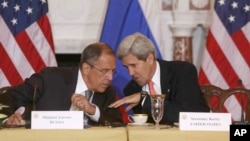STATE DEPARTMENT —
U.S. Secretary of State John Kerry and Defense Secretary Chuck Hagel began meetings with Russian Foreign Minister Sergei Lavrov and Russian Defense Minister Sergei Shoigu by acknowledging challenges in the relationship between the two countries. Meetings at the State Department come a few days after President Barack Obama said he would not travel to Moscow to meet the Russian president next month.
The four U.S. and Russian officials are discussing many areas on which they agree, from cooperation in Afghanistan to ending North Korea’s nuclear program. But it’s their disagreements that are making headlines.
At the start of the meeting Friday, U.S. Secretary of State John Kerry said the two nations were not going to shy away from the “occasional collision.”
“The relationship between the United States and Russia is needless to say a very important relationship, and it is marked by both shared interests and at times colliding and conflicted interests. I think that we’re all very clear-eyed about that," said Kerry.
Russia recently granted temporary asylum to U.S. national security information leaker Edward Snowden, despite U.S. requests to extradite him. Secretary Kerry is expected to again ask Russia to turn over Snowden during Friday’s talks.
Russia’s support of the government of Syrian President Bashar al-Assad also will be a heated topic. The U.S. favors the opposition in the Syrian civil conflict. The Middle East Institute’s Graeme Bannerman says finding common ground on divisions like Syria will be difficult.
"I think the Russians just have a very different world view than we do, and therefore, it's going to be hard for either side to change the view," said Bannerman.
There are other disputes. Russia is angry over U.S. plans for a missile defense system in Europe, and has resisted U.S. efforts to impose tighter sanctions on Iran because of its nuclear programs. Washington has concerns about Russia's human rights record.
But Anthony Cordesman, of the Center for Strategic and International Studies, says some of the tensions are not as drastic as they appear.
“Some of them tend to be exaggerated. The whole debate over ballistic missile defenses, that is a political convenience to the Russians. They obviously realize that we are not going to create the defenses that could interfere with their capability to strike the United States," said Cordesman.
After President Barack Obama’s recent cancelation of a planned one-on-one meeting next month with Russian President Vladimir Putin, analysts say Friday’s talks are a very important step toward smoothing relations.
The meetings are expected to last until mid-afternoon Friday.
The four U.S. and Russian officials are discussing many areas on which they agree, from cooperation in Afghanistan to ending North Korea’s nuclear program. But it’s their disagreements that are making headlines.
At the start of the meeting Friday, U.S. Secretary of State John Kerry said the two nations were not going to shy away from the “occasional collision.”
“The relationship between the United States and Russia is needless to say a very important relationship, and it is marked by both shared interests and at times colliding and conflicted interests. I think that we’re all very clear-eyed about that," said Kerry.
Russia recently granted temporary asylum to U.S. national security information leaker Edward Snowden, despite U.S. requests to extradite him. Secretary Kerry is expected to again ask Russia to turn over Snowden during Friday’s talks.
Russia’s support of the government of Syrian President Bashar al-Assad also will be a heated topic. The U.S. favors the opposition in the Syrian civil conflict. The Middle East Institute’s Graeme Bannerman says finding common ground on divisions like Syria will be difficult.
"I think the Russians just have a very different world view than we do, and therefore, it's going to be hard for either side to change the view," said Bannerman.
There are other disputes. Russia is angry over U.S. plans for a missile defense system in Europe, and has resisted U.S. efforts to impose tighter sanctions on Iran because of its nuclear programs. Washington has concerns about Russia's human rights record.
But Anthony Cordesman, of the Center for Strategic and International Studies, says some of the tensions are not as drastic as they appear.
“Some of them tend to be exaggerated. The whole debate over ballistic missile defenses, that is a political convenience to the Russians. They obviously realize that we are not going to create the defenses that could interfere with their capability to strike the United States," said Cordesman.
After President Barack Obama’s recent cancelation of a planned one-on-one meeting next month with Russian President Vladimir Putin, analysts say Friday’s talks are a very important step toward smoothing relations.
The meetings are expected to last until mid-afternoon Friday.




